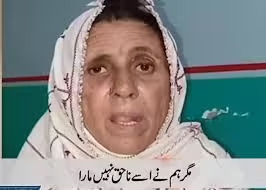Mother Justifies Balochistan Honour Killing of her daughter and requests for discharge of tribal chief Sardar Sher Baz Satakzai
In a gruesome twist in Balochistan, a recently emerged video has shaken Pakistan. The clip features the mother of Bano one of two victims in a claimed honour killing apologising for her daughter’s brutal killing as a rightful deed in line with Balochi tribal culture. Her chilling request for the liberation of tribal chief Sardar Sherbaz Satakzai, who was detained as part of the case, has sparked national outrage and reopened old arguments surrounding honour-based violence.
The timing of the statement immediately after videos were shared depicting the gruesome murder of a woman and man, reportedly during Eid al-Adha celebrations—has only fueled public anger.
The Viral Video That Sparked a National Reckoning
The incendiary video of the mourning but complicit mother was shared on social media and went viral, eliciting passionate emotional as well as political responses. Within it, she asserted that the act was “consistent with centuries-old tribal tradition,” minimizing the act as not worthy of questioning. Although clearly distraught, her message was not one of justice for her daughter but one of rallying the defence of tribal autonomy and “honour.”
Such violence, particularly by a mother, has confounded and infuriated citizens, activists, and human rights groups. Critics say it is a sad internalization of patriarchal values and a sign of the lethal meeting of cultural practices and legal impunity.
Authorities React: Arrests Made Under Rising Pressure
The Balochistan government, under mounting pressure from civil society and media, moved with speed. At least 11 suspects have been taken into custody to date, including powerful Satakzai tribe chief, Sardar Sherbaz Satakzai. The authorities have assured that the case will be pursued to its logical conclusion and justice meted out to the victims and their families.
Law enforcement authorities confirmed the suspects were implicated in the so-called “honour killing,” and investigations are under way to pin down additional perpetrators and enablers. “This is not tradition; this is murder,” said one senior official.
A Nation Divided: Culture vs. Constitution
The Balochistan honour killing has again brought into the limelight the divergence of Pakistan’s constitutional law from tribal practices. The Constitution of Pakistan may declare the right to life and deplore extrajudicial killings, yet tribal regions tend to operate with their own parallel systems based on Jirga traditions. The duplicity leaves many and particularly women exposed without any cover of the law or any voice.
Human rights activists emphasize that justifying such killings in the guise of culture is facilitating violence and eroding the rule of law. “We cannot let barbarity be wrapped in tradition,” declared a Human Rights Commission of Pakistan (HRCP) representative.
Public Outrage and Demand for Reforms
Social media has also become arenas of war for the debate. Hashtags #JusticeForBano and #EndHonourKillings are going viral, with citizens calling for systemic change and a national clampdown on tribal justice. The message from the people is clear: cultural practices cannot take precedence over fundamental human rights.
Others are also urging parliamentarians to revisit legal provisions that enable families to forgive murderers in honour-related crimes a frequently abused loophole that leaves perpetrators free.
A Test for Justice and Humanity
Bano’s tragic case and her own mother’s chilling defense of her murder are a mirror of a society standing at a crossroads. As Pakistan struggles with the heritage of tribal codes and the promise of modern justice, the event itself could become a turning point or another forgotten tragedy.
For the time being, the nation observes as the legal system is tested and hopes that on this occasion, justice will not be offered to the gods of honour at the altar of justice being sacrificed.
For up-to-date coverage of this story and more, visit Pakistan Updates.




